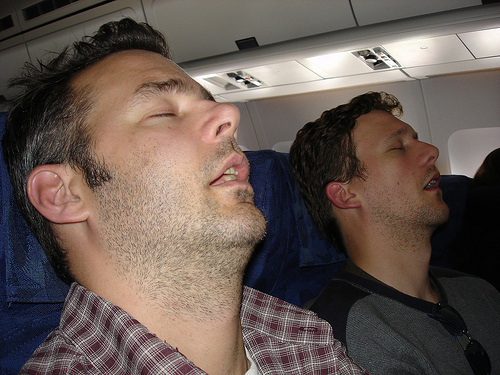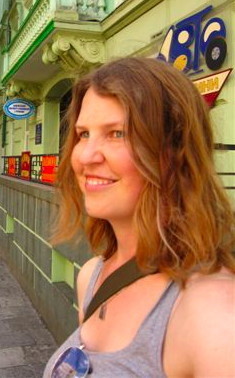Rolf Potts's Blog, page 116
October 21, 2011
The science of sleeping on planes

Sleeping in a plane. Photo: Ian Mackenzie / Flickr
It's a common traveler's dilemma: to avoid jet lag after a long-haul flight, you should really sleep on the plane. That way, you can wake up refreshed and already be on local time. The problem: you can't sleep on planes.
If you've ever arrived at an airport feeling groggy like Bill Murray's character in the film Lost in Translation, you're not alone. Seth Kugel, who writes the "Frugal Traveler" column for The New York Times, decided to get to the bottom of mystery of sleeping in the skies: Cramped in coach, or the science of sleep. Kugel interviews a doctor and a psychologist to learn why someone dozes in the clouds, and find any solutions.
A German friend of mine likes to go dancing in a nightclub until he has to go to the airport. He swears it gets him nice and tired, so as soon as he gets in his seat, he goes to sleep immediately. I've done the opposite, try to wake up extra early so that I'm eager to get back to snoozing.
Do you have trouble getting rest in the air? How do you solve this problem? Please share your tips and tricks in the comments.
October 20, 2011
Travel widens the scope of how you understand world events
"So many Americans, for one reason or another, they watch the news and it doesn't really give them the idea of the world. Or they don't read or travel. They have no idea that America is part of the world and not the world itself. And so anything from the travel stories I tell, that's what I'm trying to get across. That you have to realize there are other people, other economies, governments, cultures, religions, and destinies going on at the same time as yours. You have to widen the scope of your lens and start seeing more."
–Henry Rollins, "Patriot Missile," Guernica, May 2008
October 17, 2011
There is no shame in traveling for the sheer fun of it
"I came to the conclusion that some more ascetic reason than mere enjoyment should be found if one wishes to travel in peace: to do things for fun smacks of levity, immorality almost, in our utilitarian world. And though personally I think the world is wrong, and I know that in my heart of hearts that it is a most excellent reason to do things merely because one likes the doing of them, I would advise all those who wish to see unwrinkled brows in passport offices to start out ready labeled as entomologists, anthropologists, or whatever -ology they think suitable and propitious. But as this book is intended for the Public, and is therefore necessarily truthful, I must admit that for my own part I traveled single-mindedly for fun."
–Freya Stark, The Valleys of the Assassins (1934)
(1934)
October 14, 2011
Supermarkets: cultural hotspots

A wrestler in a supermarket. Photo: Hernan Garcia Crespo / Flickr
One of the great things about travel is how even ordinary errands can become cultural adventures. For example, the simple act of going grocery shopping. Ben Groundwater, who writes "The Backpacker" column for The Sydney Morning Herald, waxed poetic in this article: Culture shop: the joy of supermarkets.
Groundwater recounts his memories of his favorite supermarkets. He admits that he sometimes remembers them better than the sightseeing landmarks. Taste and even smell are powerful senses, often intimately linked to our memories. The bite of a certain kind of kung pao chicken will always send my mind back to a certain Szechuan restaurant in Taipei, Taiwan. The taste of a particular cheese brings back visions of France. The list goes on.
Have you ever been to any supermarkets or street markets that made an impression? Please share your stories in the comments.
October 13, 2011
Susan Sontag on how paradise is always being lost
"Travelers continue, in ever larger numbers, to make trips to exotic, non-Western lands, which seem to answer to some of the old stereotypes: that simpler society, where faith is pure, nature pristine, discontent (and its civilization) unknown. But paradise is always being lost. One of the recurrent themes of modern travel narratives is the depredations of the modern, the loss of the past — the report on a society's decline. The nineteenth-century travelers are noting the inroads in the idyllic life in, say, the South Sea made by the modern money-economy, for travelers who would never dream of living like the natives generally still want the natives to stay wholesome, rustic, sexy, and uncomfortable."
–Susan Sontag, Where the Stress Falls: Essays (2002)
(2002)
October 12, 2011
Vagabonding Case Study: Sara Schultz
Sara Schultz
Age: 35
Hometown: Minot, ND / Portland, OR
Quote: "You'll never feel more alive and a part of the world than you do when you are on a long-term traveling adventure."
How did you find out about Vagabonding, and how did you find it useful before and during the trip?
It seems I read an article by Rolf Potts, which lead me to Vagabonding. I read the book two or three times. The tips about how to actually construct a grand international move, a year off, and staying sane on the road were the most helpful.
How long were you on the road?
Depends on how you count it, but nearly four years abroad in two separate stints with about four months stateside between the two.
Where all did you go?
New Zealand, Cook Islands, Fiji, Thailand, Singapore, Malaysia, Cambodia, Vietnam, Taiwan, Burma, Laos, Germany, Czech Republic, Hungary, Slovakia, Slovenia, Croatia, Italy, Austria, Switzerland, Bosnia & Herzegovina, Albania, Montenegro, Macedonia, Bulgaria, Serbia, Portugal, Greece, Turkey, France, Netherlands, Belgium, Denmark, Sweden, Poland, Lithuania, Latvia, Ukraine, USA (OR, WA, MT, ND, ID, MN, WI, IL, IA).
What was your job or source of travel funding for this journey?
I'm an optometrist by trade. When I work, I live quite simply (still much like a student), so I'm able to save a lot of money for times when I'm unemployed.
Did you work or volunteer on the road?
On the road, I worked a week in a hostel in Oamaru, NZ, which was really fun, and a few tries at WOOFing in New Zealand, which I didn't really enjoy. I worked for one year abroad at the University of Auckland, and nineteen months with the US Army in Germany.
Of all the places you visited, which was your favorite?
Sofia was a city filled with guardian angels and strange chance encounters on each of my three visits. Istanbul, Lisbon and Athens all surprised me with their easy-wandering streets and gritty artsiness. I didn't expect Sarajevo's Turkish influence, and the history of the siege of Sarajevo made a lot more sense after seeing the layout of the city. Poland and its people reminded me of the Midwest, both the landscape and its people, and seemed fitting as a last stop abroad before returning home.
Was there a place that was your least favorite, or most disappointing, or most challenging?
I was not fond of Serbia, though I tried it twice. Mostly people were not very friendly in general, except for a few. Albania was pretty rustic (challenging) but interesting. I heard a lot of good things about Budapest and Vienna but found them both to be overpriced shades of grey.
Did any of your pre-trip worries or concerns come true? Did you run into any problems or obstacles that you hadn't anticipated?
I didn't have a lot of pre-trip worries. I'd traveled a lot in the past without problems. But I was robbed in Barcelona (a pair of men cut my purse off and ran). It was totally unexpected and resulted in months of fraud on my bank accounts even after the bank cards were cancelled. I chalked it up as something that was going to happen sooner or later, but it still was not a fun time.
Which travel gear proved most useful? Silicone ear plugs, eye mask, universal drain plug, small waterproof backpack.
Least useful? iPod, tiny speakers.
What are the rewards of the vagabonding lifestyle?
Most of the focus is on basic needs: food, friends, roof over the head, learning and seeing. Less attachment to things. Distilling life down to the basics is the most rewarding thing- I realized how much of my energy was wasted on a lot of things that have little meaning.
What are the challenges and sacrifices of the vagabonding lifestyle?
Emotions swing with greater intensity and greater frequency than they do in real life. Occasional self-doubts and loneliness surface made me wonder what I was doing. Being separated from family and good friends, even with internet connection was sometimes hard. Also, it's a lot of work to travel and no one really tells you that, or understands that unless they've done it- the planning, the packing, constantly making new friends…
What lessons did you learn on the road?
Learning who was trustworthy based on intuition, making friends quickly and parting, and establishing friendships which may carry on for years after even if we only met for a few days or a few hours.
How did your personal definition of "vagabonding" develop over the course of the trip?
It's really about living simply and adapting to different situations, whether sleeping on a hostel floor, or in an aunt's spare bedroom, or in a flat above a garage in New Zealand and making the best of the situation and place.
If there was one thing you could have told yourself before the trip, what would it be?
You'll never feel more alive and a part of the world than you do when you are on a long-term traveling adventure.
Any advice or tips for someone hoping to embark on a similar adventure?
It's easier than you think it will be. Try to sketch out a rough route of where you're going to go (dates not really necessary, unless you're really trying to kill yourself with too many locations), and then follow the path like a pilgrimage, taking extra days when you feel like it and moving on when that urge hits too. It matters more that you are going somewhere than where you are going.
When and where do you think you'll take your next long-term journey?
Probably South America, whenever the time comes up. It could be in two years or in six months… I just watch for the opening and go!
Website: gladpike.blogspot.com
Are you a Vagabonding reader planning, in the middle of, or returning from a journey? Would you like your travel blog or website to be featured on Vagabonding Case Studies? If so, drop us a line at casestudies@vagabonding.net and tell us a little about yourself.
October 10, 2011
Be skeptical travel writers who make grand generalizations
"One says in Mexico: one means, after all, one little town away South in the Republic: an in this little town, one rather crumbly adobe house built round two sides of a garden patio: and of this house, one spot on the deep shady veranda facing inwards to the trees, where there are on an onyx table and three rocking chairs and one little wooden chair, a pot with carnations, and a person with a pen. We talk so grandly, in capital letters, of Morning in Mexico. All it amounts to is one little individual looking at a bit of sky and trees, then looking down at the page of his exercise book. It is a pity we don't always remember this. When books came out with grand titles, like The Future of America or The European Situation, it's a pity we don't immediately visualize a thin or fat person, in a chair or in a bed, dictating to a bob-haired stenographer or making little marks on paper with a fountain pen."
–D.H. Lawrence, Mornings in Mexico (1927)
(1927)
October 8, 2011
Special October 2011 fares for multi-stop tickets on BootsnAll
There are plenty of reasons to take a RTW trip – travel could be your #1 passion in the world, you could be just out of high school or college looking to take a gap year, or you could be burnt out with your job. No matter what your reason, Meet, Plan, Go! is hosting a nation-wide event on October 18 that will help push you towards taking the trip of a lifetime.
If you've dreamed of taking a career break or sabbatical, then this is the event for you. With hosts and panelists who have successfully done it all before, you will not only be inspired to take off on your own RTW trip, but you will find all the tools necessary that show you how to go about taking a successful career break to travel the world. Many travel-lovers think that a career break will ruin their career, but it may just be the best career move you'll ever make. The hosts and panelists will inform you of different career skills that travel will improve. Tickets are on sale now in 17 cities across the US and Canada, so be sure to secure them before they sell out!
Once you decide to finally take that plunge, you will need to start looking for RTW plane ticket deals. BootsnAll has monthly deals that can take you all over the world – these deals are good through October 31, 2011:
Around The World By Air and Foot: Los Angeles – Guatemala City – San Jose (Costa Rica) – Quito – OVERLAND – Sao Paulo – Johannesburg – OVERLAND – Nairobi – Cairo – Athens – OVERLAND – Istanbul – Dubai – Kathmandu – OVERLAND – Colombo – Kuala Lumpur – OVERLAND – Bali (Denpasar) – Perth – OVERLAND – Sydney – Christchurch – OVERLAND – Auckland – Rarotonga (Cook Islands) – Los Angeles from US$4295 plus taxes
Asia From All Sides San Francisco – Singapore – Kathmandu – OVERLAND – Delhi – Bangkok – Saigon / Ho Chi Minh City – OVERLAND – Hanoi – Seoul – San Francisco from US$1699 plus taxes
Circle The Pacific San Francisco – Sydney – OVERLAND – Perth – Bali (Denpasar) – Singapore – OVERLAND – Kuala Lumpur – Tokyo – San Francisco from US$1985 plus taxes
If you are looking for something a little different in your round the world trip, then start planning your trip of a lifetime with our RTW trip planner And don't forget to sign up for BootsnAll's RTW newsletter, delivering RTW trip planning advice and resources via email every single month.
October 7, 2011
How Steve Jobs and Apple changed travel forever

Apple founder Steve Jobs, who "thunk different." Photo: andrechinn / Flickr
The media lit up with commemorations of Steve Jobs, the legendary CEO of Apple who passed away on Oct. 5, 2011. While talking about his full impact on technology is beyond the scope of this blog, we can talk about how his products changed our trips: How Steve Jobs helped make Apple a major disruptor in travel.
The iPhone was not the first smartphone that could access the Internet. However, it was a level ahead of its competitors in offering a fuller web experience. At the time, web surfing on phones was much more limited. The iPhone made touchscreens and apps popular.
Photos used to be developed at stores, then painstakingly assembled into binders as photo albums. Now with the right apps, you can snap a picture with your phone and send it out to your friends instantly. Apple's devices pulled off the feat of making the world smaller, more personal, and more connected.
This is only the beginning. About a year ago, there was news that Apple was developing iTravel, an app for the iPhone. According to patent filings, iTravel would integrate transportation booking, check-in, and social networking. It would turn your iPhone into an electronic ticket–and ticket agent. We can only imagine how Jobs would have presented it at a future Apple summit.
Do you use Apple products? How have they affected your travels? Please share your thoughts in the comments.
Steve Jobs' 2005 commencement speech at Stanford University:
October 6, 2011
Loneliness is an essential part of travel
"You are simply not lonely enough when you travel with companions… Spells of acute loneliness are an essential part of travel. Loneliness makes things happen."
–Jonathan Raban, Driving Home: An American Journey (2011)
(2011)
Rolf Potts's Blog
- Rolf Potts's profile
- 323 followers




